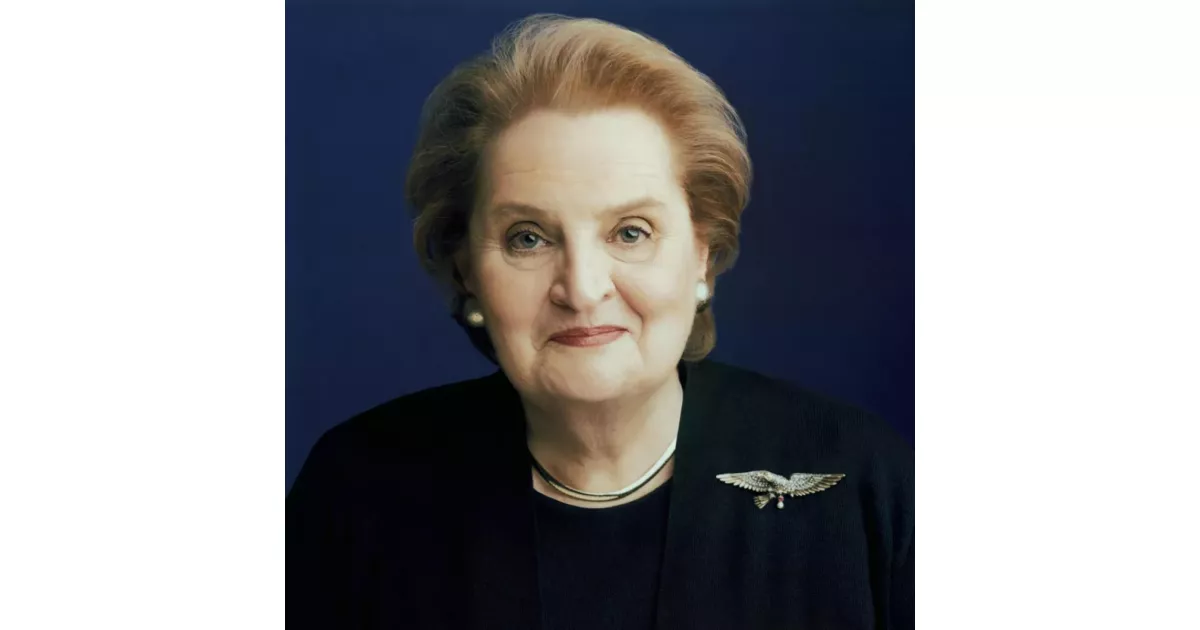Madeleine Albright (1937-2022) was a prominent American diplomat and political scientist who served as the first female United States Secretary of State under President Bill Clinton. Born in Czechoslovakia, her family fled first to England and later immigrated to the United States. Albright earned a PhD in Public Law and Government from Columbia University and rose through the ranks of Democratic politics, holding positions such as the U.S. Ambassador to the United Nations before her appointment as Secretary of State. During her tenure, she advocated for NATO expansion, intervened in the Bosnian War and Kosovo conflict, and promoted democracy and human rights. Her distinguished career broke barriers for women in international relations and left a lasting mark on American foreign policy.
May 15, 1937: Birth of Madeleine Albright
Madeleine Albright was born on May 15, 1937, in Prague, Czechoslovakia.
1937: Birth of Madeleine Albright
Madeleine Albright was born Marie Jana Körbelová in Prague, Czechoslovakia in 1937.
September 1938: Albright family goes into exile
In September 1938, following the Munich Agreement and the German occupation of Czechoslovakia, the Albright family was forced into exile.
May 1939: Albright family moves to Britain
The Albright family moved to Britain in May 1939 to escape the Nazi occupation.
1939: Family Flees Czechoslovakia
In 1939, Madeleine Albright's family fled Czechoslovakia for England to escape anti-Jewish persecution.
1941: Parents' Conversion to Catholicism
Madeleine Albright's parents converted from Judaism to Catholicism in 1941 while living in England as refugees from Czechoslovakia.
1941: Albright's parents convert to Catholicism
Madeleine Albright's parents, Josef and Anna, converted from Judaism to Catholicism in 1941.
November 5, 1948: Albright family leaves Southampton
The Albright family departed from Southampton, UK, on November 5, 1948, en route to the United States.
November 11, 1948: Albright family arrives in New York
On November 11, 1948, the Albright family arrived at Ellis Island in New York Harbor.
1948: Communist takeover forces Korbel's resignation
Following the Communist Party's takeover of the Czechoslovakian government in 1948, Josef Korbel, Madeleine Albright's father, was forced to resign from his diplomatic position.
1948: Albright family immigrates to the United States
Following the communist coup d'état in Czechoslovakia in 1948, the Albright family immigrated to the United States.
1955: Albright graduates from Kent Denver School
Madeleine Albright graduated from Kent Denver School in Cherry Hills Village, Colorado, in 1955.
1957: Albright becomes a U.S. citizen
Madeleine Albright became a U.S. citizen in 1957.
1959: Albright graduates from Wellesley College
Madeleine Albright graduated from Wellesley College in 1959.
1959: Marriage to Joseph Albright and Conversion to Episcopalianism
Madeleine Albright married Joseph Albright and converted to the Episcopal Church in 1959.
1959: Albright marries Joseph Albright
Madeleine Korbel married Joseph Albright in Wellesley in 1959 shortly after graduating.
1962: Albright family moves to Washington, D.C.
In 1962, the Albright family moved to Washington, D.C.
1963: Return to Long Island
Following the death of Joseph Albright's aunt, Alicia Patterson, in 1963, the Albrights moved back to Long Island with the intention of Joseph taking over the family newspaper business.
1967: Birth of Katharine Albright
Madeleine Albright gave birth to her third daughter, Katharine Medill Albright, in 1967.
1968: Return to Washington D.C.
Albright returned to Washington D.C. in 1968 and commuted to Columbia University for her Ph.D.
1968: Doctoral Studies and Prague Spring
In 1968, Albright began her doctoral studies at Columbia University, focusing her dissertation on the role of journalists in the Prague Spring.
1972: Fundraising for Muskie Campaign
Albright began fundraising for Senator Ed Muskie's presidential campaign in 1972, marking the beginning of her involvement in politics.
1975: Albright earns PhD from Columbia University
In 1975, Madeleine Albright received her PhD from Columbia University, where her thesis focused on the Prague Spring.
1976: Legislative Assistant to Muskie
In 1976, Albright became chief legislative assistant to Senator Ed Muskie.
1976: Albright begins working for Senator Edmund Muskie
Madeleine Albright began working as an aide to Senator Edmund Muskie in 1976.
1978: Albright's work with Senator Muskie ends
Madeleine Albright's time working for Senator Edmund Muskie ended in 1978.
1978: National Security Council Liaison
Recruited by Zbigniew Brzezinski, Albright joined the National Security Council as the congressional liaison in 1978.
1980: Move to Woodrow Wilson Center
After Carter's defeat in 1980, Albright moved to the Woodrow Wilson International Center for Scholars.
1981: Albright leaves the National Security Council
In 1981, with the end of Jimmy Carter's presidency, Madeleine Albright left her position on the National Security Council.
1982: Georgetown University Appointment
In 1982, Albright joined the academic staff at Georgetown University, specializing in Eastern European studies.
1982: Divorce from Joseph Albright
Madeleine Albright divorced Joseph Albright in 1982.
1982: Albright joins Georgetown University faculty
Madeleine Albright joined the faculty of Georgetown University in 1982.
1983: Divorce
Albright's divorce from her husband, Joseph Albright, was finalized in 1983.
1984: Foreign Policy Advisor
Albright served as a foreign policy advisor for Democratic vice-presidential candidate Geraldine Ferraro in 1984.
1988: Advising Dukakis Campaign
Albright advised presidential candidate Michael Dukakis on foreign policy during his 1988 campaign.
1990: Start of UN Sanctions against Iraq
In 1990, the UN imposed sanctions against Iraq following its invasion of Kuwait.
1992: Albright assists with Clinton's National Security Council
After Bill Clinton won the 1992 presidential election, Madeleine Albright played a role in establishing his National Security Council.
1992: National Security Council Transition Team
Albright was involved in the transition process for the National Security Council after Bill Clinton's election victory in 1992.
January 1993: Nomination as UN Ambassador
President Clinton nominated Albright to be the U.S. Ambassador to the United Nations in January 1993.
February 9, 1993: Appointment as UN Ambassador
Albright officially became the U.S. Ambassador to the United Nations on February 9, 1993.
1993: Casualties in Somalia
Following the deaths of U.S. peacekeepers in Somalia in 1993, Boutros-Ghali became a political scapegoat in the United States.
1993: Albright becomes U.S. Ambassador to the United Nations
Madeleine Albright served as the United States Ambassador to the United Nations from 1993 to 1997.
1994: Rwandan Genocide
During the Rwandan genocide in 1994, Albright, as U.S. Permanent Representative to the U.N., initially hesitated to label the killings as genocide.
March 2, 1996: Memorial Service and "Libertad" Chants
On March 2, 1996, Albright attended a memorial service for the victims of the Brothers to the Rescue incident, where she was greeted with chants of "libertad."
May 12, 1996: UN Sanctions Against Iraq
On May 12, 1996, then-ambassador Madeleine Albright defended UN sanctions against Iraq on 60 Minutes, stating that the price of sanctions, even resulting in the deaths of children, was "worth it." This statement drew considerable criticism and was later characterized by Albright as a mistake.
1996: Operation Orient Express
In 1996, Albright was involved in a secret pact known as "Operation Orient Express" aimed at ousting UN Secretary-General Boutros Boutros-Ghali.
1996: Honorary Degree from Brandeis University
In 1996, Madeleine Albright received an honorary degree from Brandeis University.
January 1997: Nomination and Appointment as Secretary of State
In January 1997, Albright was nominated and subsequently appointed as the first female U.S. Secretary of State.
July 1, 1997: Handover of Hong Kong
Albright represented the U.S. at the transfer of sovereignty over Hong Kong on July 1, 1997.
October 1997: Support for Kyoto Protocol Exemptions
In October 1997, Albright expressed support for national security exemptions to the Kyoto Protocol.
1997: Albright learns of her Jewish heritage
In 1997, Madeleine Albright revealed that she learned about her Jewish heritage only recently.
1997: Madeleine Albright becomes the first female Secretary of State
In 1997, Madeleine Albright was appointed as the 64th United States Secretary of State, making history as the first woman to hold this position.
1997: Discovery of Jewish Ancestry
In 1997, shortly after becoming Secretary of State, Madeleine Albright learned about her Jewish ancestry and the deaths of several relatives in the Holocaust.
1997: Honorary Degree from Mount Holyoke College
Madeleine Albright was awarded an honorary degree from Mount Holyoke College in 1997.
February 19, 1998: "Indispensable Nation" Remark
On February 19, 1998, during an interview on The Today Show, Albright declared the United States as the "indispensable nation," asserting its unique role in global affairs.
April 1998: Security Concerns at Nairobi Embassy
In April 1998, U.S. ambassador to Kenya Prudence Bushnell appealed to Washington, including Madeleine Albright directly, for heightened security at the Nairobi embassy. These requests were reportedly ignored.
1998: NATO's "Three Ds"
During the 1998 NATO summit, Albright introduced the "three Ds" principle: no diminution, no discrimination, and no duplication within NATO, outlining a vision for the alliance's future.
1998: Induction into National Women's Hall of Fame
Madeleine Albright was inducted into the National Women's Hall of Fame in 1998.
March 2000: Honorary Silver Medal of Jan Masaryk
In March 2000, Madeleine Albright was awarded the Honorary Silver Medal of Jan Masaryk in Prague.
2000: Meeting with Kim Jong-il
In 2000, Albright made a historic visit to North Korea, becoming one of the highest-ranking Western officials to meet with leader Kim Jong-il.
January 8, 2001: Farewell Call to Kofi Annan
On January 8, 2001, Albright reaffirmed the U.S. commitment to pressuring Iraq on WMD disarmament during a farewell call to UN Secretary-General Kofi Annan.
January 20, 2001: End of Albright's Tenure as Secretary of State
January 20, 2001, marked the end of Madeleine Albright's service as the United States Secretary of State.
2001: Receipt of the U.S. Senator H. John Heinz III Award
Albright received the prestigious U.S. Senator H. John Heinz III Award for Greatest Public Service by an Elected or Appointed Official in 2001.
2001: Founding of the Albright Group
In 2001, Albright established the Albright Group, an international strategy consulting firm based in Washington, D.C., marking her transition into the private sector.
2001: End of Albright's term as Secretary of State
Madeleine Albright's term as Secretary of State ended in 2001.
2002: Honorary Degree from University of Washington
In 2002, Madeleine Albright received an honorary degree from the University of Washington.
2003: Joining the NYSE Board of Directors
Albright joined the New York Stock Exchange's board of directors in 2003.
2003: Honorary Degrees from Smith College and Washington University in St. Louis
Madeleine Albright received honorary degrees from both Smith College and Washington University in St. Louis in 2003.
October 25, 2005: Guest Appearance on Gilmore Girls
Albright made a guest appearance as herself on the television show Gilmore Girls on October 25, 2005.
2005: Founding of Albright Capital Management
Albright founded Albright Capital Management in 2005, focusing on private fund management in emerging markets.
2005: Resignation from NYSE Board
Albright resigned from the NYSE board in 2005 following the Richard Grasso compensation scandal.
2005: Honorary Degree from University of Winnipeg
In 2005, the University of Winnipeg awarded Madeleine Albright an honorary degree.
2006: Discussion of Fitness Regimen
In 2006, Madeleine Albright discussed her physical fitness and exercise routine in interviews.
2006: Great Immigrants Award
Madeleine Albright received the Great Immigrants Award from the Carnegie Corporation in 2006.
November 13, 2007: Co-chair of Genocide Prevention Task Force
On November 13, 2007, Albright and William Cohen were announced as co-chairs of a new Genocide Prevention Task Force, a move that drew criticism due to their past stances on the Armenian genocide.
November 16, 2007: Stepping Down from Council of Women World Leaders
On November 16, 2007, Albright concluded her role as chairwoman of the Council of Women World Leaders Women's Ministerial Initiative, passing the baton to Margot Wallström.
2007: Honorary Degree from University of North Carolina at Chapel Hill
Madeleine Albright received an honorary degree from the University of North Carolina at Chapel Hill in 2007.
December 1, 2008: Hillary Clinton Nominated for Secretary of State
Albright's close friend and informal advisor, Hillary Clinton, was nominated for the position of Secretary of State by President-elect Barack Obama on December 1, 2008. Albright had endorsed and supported Clinton's presidential campaign earlier that year.
2008: Honorary Degree from Knox College
Knox College awarded Madeleine Albright an honorary degree in 2008.
2008: Josef Korbel School of International Studies named
The Josef Korbel School of International Studies at the University of Denver was named in honor of Madeleine Albright's father in 2008.
September 2009: Read My Pins Exhibition and Book
Albright's personal jewelry collection went on display at the Museum of Art and Design in New York City in September 2009, accompanied by her book "Read My Pins: Stories from a Diplomat's Jewel Box."
January 2010: End of Read My Pins Exhibition
The exhibition of Madeleine Albright's pin collection at the Museum of Art and Design in New York City concluded in January 2010.
2010: Induction into Colorado Women's Hall of Fame
In 2010, Madeleine Albright was inducted into the Colorado Women's Hall of Fame.
2011: Founding of The Hague Institute for Global Justice
The Hague Institute for Global Justice, for which Albright later served as chair of the advisory council, was founded in 2011.
May 2012: Albright receives Presidential Medal of Freedom
In May 2012, Madeleine Albright was awarded the Presidential Medal of Freedom by President Barack Obama.
August 2012: "Blame Forever" Comment
In August 2012, Albright made a pointed remark at an Obama campaign event, stating she would blame the previous administration "forever" for current problems.
October 2012: Criticism of Mitt Romney's Foreign Policy Stance
In October 2012, Albright publicly criticized Mitt Romney's assessment of Russia as the United States' top geopolitical foe, questioning his understanding of 21st-century global dynamics.
2012: Proposed Privatization of Kosovo's Telecom
In 2012, Albright's investment firm, Albright Capital Management, prepared a bid for the privatization of Kosovo's telecom company. This bid was controversial due to Albright's involvement in the 1999 NATO bombing of Serbia and was eventually withdrawn.
March 2013: Listed Among 50 Best-Dressed Over 50s
In March 2013, Madeleine Albright was included in The Guardian's list of the 50 best-dressed over 50s.
2013: Honorary Degree from Bowdoin College
Madeleine Albright received an honorary degree from Bowdoin College in 2013.
2014: Honorary Degree from Dickinson College
In 2014, Dickinson College awarded Madeleine Albright an honorary degree.
2015: Honorary Degree from Tufts University
Madeleine Albright received an honorary degree from Tufts University in 2015.
2016: Chair of Albright Stonebridge Group and Advisory Roles
After 2016, Albright continued her work as chair of the Albright Stonebridge Group and held advisory roles with The Hague Institute for Global Justice and the World Justice Project.
2016: Professor at Georgetown University
As of 2016, Albright was serving as the Mortara Distinguished Professor of Diplomacy at the Georgetown University School of Foreign Service.
2016: "Special Place in Hell" Remark
During Hillary Clinton's 2016 presidential campaign, Madeleine Albright made a controversial remark stating "there's a special place in hell for women who don't help each other," which drew criticism and was later clarified by Albright in a New York Times op-ed.
2017: Study on Iraq Sanctions and Child Mortality
A 2017 study published in the British Medical Journal of Global Health challenged the widely held belief that UN sanctions significantly increased child mortality in Iraq during the 1990s and early 2000s. The study suggested the data were fabricated by the Iraqi government.
2020: Apology for Remarks on UN Sanctions
In 2020, Madeleine Albright apologized for her 1996 remarks regarding the UN sanctions against Iraq, calling them "totally stupid" in an interview with The New York Times.
2020: Time Magazine's 100 Powerful Women
In 2020, Time magazine recognized Madeleine Albright as one of the 100 powerful women who defined the last century.
2020: Albright Addresses Sanctions Controversy in Memoir
In her 2020 memoir, Madeleine Albright addressed the controversy surrounding her 1996 remarks and the impact of UN sanctions on Iraq. She acknowledged her mistake while also citing a 2017 study that questioned the previously accepted data on child mortality.
2021: Forbes 50 Over 50
In 2021, Madeleine Albright was selected for the inaugural Forbes 50 Over 50 list, recognizing her continued impact and leadership.
March 23, 2022: Death of Madeleine Albright
Madeleine Albright passed away on March 23, 2022.
Mentioned in this timeline

Bill Clinton the nd U S President - served as...

Barack Obama the th U S President - was the...

Hillary Diane Rodham Clinton is an American politician lawyer and...

Washington D C is the capital city and federal district...
The Guardian is a British daily newspaper founded in as...
Hong Kong is a Special Administrative Region of the People's...
Trending
2 months ago GameStop's Valuation, Investor Sentiment, Burry's Email, and Strategic Shifts Analyzed.

3 months ago Lindsey Vonn's record-breaking career, teaching older athletes, and Milan Olympics ad.
3 months ago Europe and Germany Increase Support and Negotiation Efforts for Ukraine Amidst War

9 months ago PSG triumphs over Arsenal; Enrique reflects on Barcelona's Champions League absence.
Silver Ag a transition metal with atomic number is a soft lustrous whitish-gray element notable for its exceptional electrical conductivity...

2 months ago Scarlett Johansson defends Woody Allen support, citing integrity and beliefs in new interview.
Popular

Thomas Douglas Homan is an American law enforcement officer who...

William Franklin Graham III commonly known as Franklin Graham is...

XXXTentacion born Jahseh Dwayne Ricardo Onfroy was a controversial yet...

Kristi Noem is an American politician who has served as...

Jupiter is the fifth and largest planet from the Sun...

Instagram is a photo and video-sharing social networking service owned...
